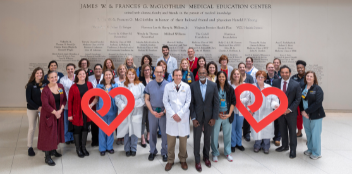International researchers hone skills in fellowship
A VCU Health Pauley Heart Center and Hospital Italiano de Buenos Aires collaboration produces promising young researchers in the field of cardiology
Horacio Medina de Chazal, M.D., said the year he spent as a Virginia Commonwealth University and Hospital Italiano de Buenos Aires (VCU-HIBA) fellow in interventional cardiology gave him invaluable clinical research experience and jump-started his voracious pursuit of excellence in cardiology.
Medina de Chazal is one of nearly a dozen physicians to participate in the VCU-HIBA cardiology research fellowship, a partnership that began over a decade ago. Postdoctoral fellows from HIBA in Buenos Aires, Argentina, are selected by VCU and HIBA partners for their exemplary clinical expertise to hone research skills at VCU under Antonio Abbate, Ph.D., M.D., the James C. Roberts, Esq. Professor of Cardiology in the VCU School of Medicine, and Fadi Salloum, Ph.D., the Congdon Chair in Cardiology and associate chair for research in the Department of Internal Medicine in the VCU School of Medicine.
“The main goal of the exchange program is to learn by doing research, and Dr. Abbate and his team have renowned expertise in the field. He is an amazing mentor,” Medina de Chazal said. “Working with him on clinical trials was life changing.”
The program’s first fellow, Ignacio Seropian, M.D., now oversees the operations of the VCU-HIBA partnership from Argentina and continues cardiology research at HIBA.
“Under Dr. Abbate’s mentorship, I jumped several steps higher in my career,” Seropian said. “The technology is amazing at VCU, and they are very open to new ideas and projects. I had an amazing year collaborating on basic science projects” with Abbate, Stefano Toldo, Ph.D., associate professor of cardiology in the VCU School of Medicine, and Benjamin Van Tassell, Pharm.D., vice chair for clinical research in the Department of Pharmacotherapy and Outcomes Science in the VCU School of Pharmacy.
VCU School of Medicine faculty benefit as much from the partnership as the interventional cardiology fellows from HIBA, Abbate said. “By the time they have arrived here, they are already doctors of medicine, and they are working on clinical training in cardiology,” he said. “They come here very skilled and highly motivated.” The fellows assisted Abbate or Salloum in studies on cardiac inflammation and how the condition impacts the heart after a cardiovascular event, such as a myocardial infarction, or over the course of diseases that can lead to heart failure.
“Pharmacologically, there are many new attempts to blunt this inflammatory cascade,” Salloum said. “To this end, fellows work with exploratory drugs that are designated as breakthrough therapies for heart failure.”
From 2017 to 2018, Medina de Chazal assisted Abbate, Toldo and Van Tassell on clinical trials that proved the efficacy of the drug anakinra in blunting inflammatory responses, which are driven by the protein Interleukin-1. Anakinra is typically used to block IL-1 in patients with rheumatoid arthritis. Fellows from HIBA have contributed their expertise to both the preclinical and clinical stages. The research team has been conducting clinical and translational research for more than 15 years, supported by millions of dollars in grants from the National Institutes of Health, the American Heart Association and other sources.
Van Tassell said Seropian’s work early on in the anakinra studies laid a strong foundation for the project.
“Much of our success the last 13 years stems from landmark preclinical investigations that we performed with Dr. Seropian,” Van Tassell said. “Those pivotal publications continue to serve as preliminary data for our grants and are among our most frequently cited publications.”

“The purpose of the VCU and HIBA partnership is to expose fellows to research so that when they return to HIBA to complete their interventional cardiology fellowship, and when they become faculty, they can establish a research program of their own,” Salloum said.
Juan Damonte, M.D., a current VCU-HIBA cardiology research fellow, said that so far during the program, he has honed a better understanding of research protocols, study coordination, data analysis and how to obtain research funding. “Before coming to VCU, I was more of a clinician, and not a researcher,” he said.
Hopefully, the VCU-HIBA partnership will continue to promote excellence in research and clinical practice, Abbate said. “In my mind, the fellowship embodies the purpose of a university; to bring people together to collaborate and answer questions. In this sense, the partnership meets this definition.”



